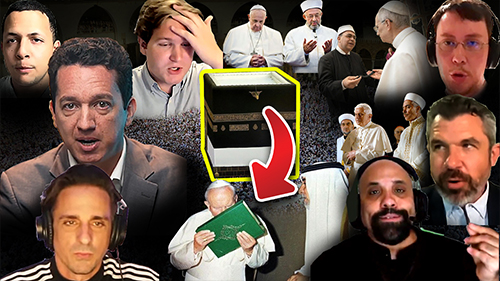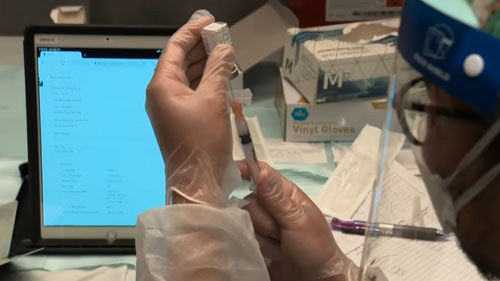| Recent Featured Videos and Articles | Eastern “Orthodoxy” Refuted | How To Avoid Sin | The Antichrist Identified! | What Fake Christians Get Wrong About Ephesians | Why So Many Can't Believe | “Magicians” Prove A Spiritual World Exists | Amazing Evidence For God | News Links |
| Vatican II “Catholic” Church Exposed | Steps To Convert | Outside The Church There Is No Salvation | E-Exchanges | The Holy Rosary | Padre Pio | Traditional Catholic Issues And Groups | Help Save Souls: Donate |  |









 " />
" /> " />
" /> " />
" /> " />
" /> " />
" />




Objection 3): You cannot know if someone is a heretic or denounce him as such without a trial and declaratory sentence.
Answer: Not so. The declaratory sentence which follows an automatic excommunication is merely a legal recognition of something which already exists. If this were not true, the automatic excommunication would be meaningless.
The excommunicated person is already severed from the Church. Most heretics are known to be heretics without a trial or declaratory sentence, and must be denounced as such.
As we see here, the Catholic Church teaches that formal processes and judgments are not necessary for ipso facto (by that very fact) excommunications to take effect. They are very often, as in the case of the heretic Martin Luther, formal recognitions of the ipso facto excommunication that has already occurred. This should be obvious to a Catholic; but to illustrate this point, here is what Martin Luther said before he was formally condemned as a heretic by the pope.
Martin Luther, speaking before the Bull of Pope Leo X giving him the final sixty days to retract before a declaration of excommunication was published: “As for me, the die is cast: I despise alike the favor and fury of Rome; I do not wish to be reconciled with her, or ever to hold any communion with her. Let her condemn and burn my books; I, in turn, unless I can find no fire, will condemn and publicly burn the whole pontifical law, that swamp of heresies.’”[3]
Are we to believe that the man who uttered this quotation (well before he was formally condemned as a heretic by a declaratory sentence) was a Catholic or could have been considered one? If such an idea isn’t patently absurd, then nothing is. Obviously, Martin Luther was a manifest heretic prior to the formal declaration, and any Catholic aware of his beliefs could have and should have denounced him as a manifest heretic once that Catholic encountered his outrageously heretical views.
That’s why, prior to the trial of Luther, Cardinal Cajetan “contacted Elector Frederick, Luther’s sovereign and protector, urging him not to ‘disgrace the good name of his ancestors’ by supporting a heretic.”[4]
The same principle applies to a heretic such as John Kerry, the notorious supporter of abortion. Almost all conservative-minded professing Catholics would immediately agree that John Kerry is a heretic and not a Catholic, since he obstinately rejects Catholic teaching against abortion. But they are making this “judgment” on their own, since no declaratory sentence has ever been issued against him. They are thus proving the point that a declaration is not necessary to condemn a heretic. Most heretics in Church history, and almost all heretics in the world today, have been and must be considered heretics without any declaration by virtue of their heresy being manifest.
When the heresy is manifest and clearly obstinate, as in the case of Luther or Benedict XVI (who says we shouldn’t convert non-Catholics and takes active part in Synagogue worship), Catholics not only can denounce him as a non-Catholic without a trial, but must do so. That is precisely why St. Robert Bellarmine, Doctor of the Church, in addressing this precise question, states unequivocally that the manifest heretic is deposed and must be avoided as a non-Catholic with no authority before any “excommunication or judicial sentence.” In this context, St. Robert uses the word “excommunication” to refer to the ferendae sententiae penalty (the formal declaration by the pope or judge).
Let us repeat that: WHICH MEANS BEFORE ANY EXCOMMUNICATION OR JUDICIAL SENTENCE! So, we can see that non-sedevacantists, in arguing that Catholics cannot denounce manifest heretics such as Benedict XVI since there hasn’t been a formal trial, have gotten it all wrong. Their conclusion makes a complete mockery out of the unity of Faith in the Church. In case we have forgotten, there is a unity of Faith in the Catholic Church (as in one, holy, Catholic and apostolic.)
According to the non-sedevacantists’ conclusion, Catholics would have to affirm communion with a man who publicly avowed that he wanted no communion with the Catholic Church, and held that the whole Pontifical law is a swamp of heresies; or a man who is obstinately pro-abortion, just because no formal declaration was made against him. To state that Catholics should hold communion with such a manifest heretic because no process against him had been completed, is contrary to Catholic teaching, Catholic Tradition and Catholic sense.
See other Answers to the Most Common Objections Against Sedevacantism
[1] The 1917 Pio-Benedictine Code of Canon Law, translated by Dr. Edward Von Peters, San Francisco, CA: Ignatius Press, 2001, canon 2314, p. 735.
[2] Denzinger 1547.
[3] The Catholic Encyclopedia, “Luther,” Robert Appleton Company, 1910, pp. 445-446.
[4] Warren H. Carroll, A History of Christendom, Front Royal, VA: Christendom Press, 2000, Vol. 4 (The Cleaving of Christendom), p. 10.
[5] The Papal Encyclicals, Vol. 4 (1939-1958), p. 41.
Sign up for our free e-mail list to see future vaticancatholic.com videos and articles.
Recent Content
^